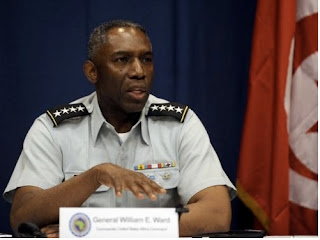 |
| General William E. Ward, commander of AFRICOM |
See also:
• AFRICOM: The Pentagon's First Direct Military Intervention in Africa (this title is obviously inaccurate. GI)
• AFRICOM and the US's Hidden Battle for Africa
Ever wonder how neo-colonial, global white supremacist projects like AFRICOM are legitimated? One piece to the puzzle is conferences like the one below. They don't actually use the phrase AFRICOM, but the intent is obvious. Manifest Destiny--protecting "American" (read: white elite supremacists) interests by any means necessary.
We need to organize a scholarly pan-African response. GI
Read call for papers below.
Reducing Insecurity in Africa: Roles and Responsibilities of the U.S. Military, U.S. Government and Non-Governmental Communities
The Naval Postgraduate School is hosting a workshop that assesses the various roles played by different actors involved in projects that span the nexus between development and security in Africa. In regions where any efforts to reduce insecurity will fail without addressing fundamental issues such as poverty, inequality, corruption and poor governance, what are the respective roles of military, non-military governmental, and non-governmental actors? Where does “development” end and “security and stabilization” begin?
In an environment where most security problems are complex security issues, however, development and security are deeply intertwined [This phrase is key. On the face of it, pairing development and security sounds reasonable, but "security" is, in reality, military mumbo jumbo for American military intervention/occupation. GI]. In this scenario, what is the role of the U.S. military in Africa and what are suitable military approaches to African security? Defining the roles and responsibilities of various actors – U.S. military, U.S. government non-military, international organizations, non-governmental organizations – becomes part and parcel of defining the challenge of finding sustainable and long-term solutions to the political and regional instabilities that plague Africa and prevent the continent from truly realizing its full potential for economic and political development. This workshop will investigate these various issues through a set of solicited papers that are presented in a close-collaborative workshop format.
Read more @ HNET
tags: africom, neo-colonialism, william e. ward
• AFRICOM and the US's Hidden Battle for Africa
Ever wonder how neo-colonial, global white supremacist projects like AFRICOM are legitimated? One piece to the puzzle is conferences like the one below. They don't actually use the phrase AFRICOM, but the intent is obvious. Manifest Destiny--protecting "American" (read: white elite supremacists) interests by any means necessary.
We need to organize a scholarly pan-African response. GI
Read call for papers below.
Reducing Insecurity in Africa: Roles and Responsibilities of the U.S. Military, U.S. Government and Non-Governmental Communities
The Naval Postgraduate School is hosting a workshop that assesses the various roles played by different actors involved in projects that span the nexus between development and security in Africa. In regions where any efforts to reduce insecurity will fail without addressing fundamental issues such as poverty, inequality, corruption and poor governance, what are the respective roles of military, non-military governmental, and non-governmental actors? Where does “development” end and “security and stabilization” begin?
In an environment where most security problems are complex security issues, however, development and security are deeply intertwined [This phrase is key. On the face of it, pairing development and security sounds reasonable, but "security" is, in reality, military mumbo jumbo for American military intervention/occupation. GI]. In this scenario, what is the role of the U.S. military in Africa and what are suitable military approaches to African security? Defining the roles and responsibilities of various actors – U.S. military, U.S. government non-military, international organizations, non-governmental organizations – becomes part and parcel of defining the challenge of finding sustainable and long-term solutions to the political and regional instabilities that plague Africa and prevent the continent from truly realizing its full potential for economic and political development. This workshop will investigate these various issues through a set of solicited papers that are presented in a close-collaborative workshop format.
Read more @ HNET
tags: africom, neo-colonialism, william e. ward
No comments:
Post a Comment